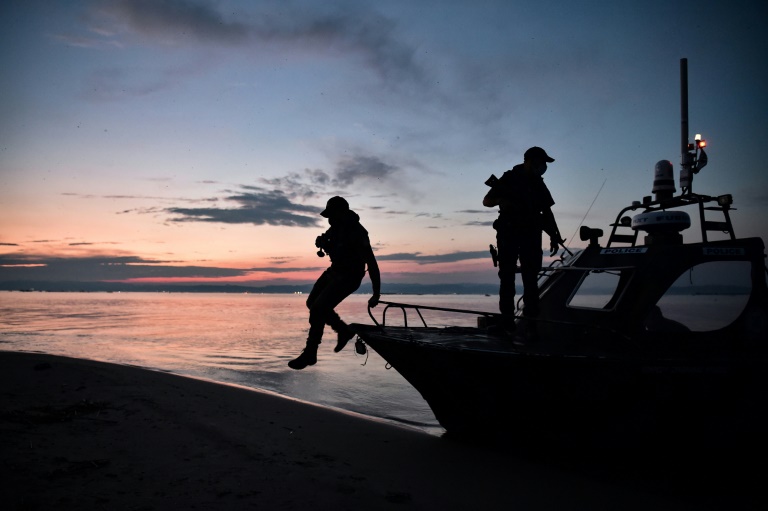Tchinda said the longed-for destination of his risky Aegean crossing — the island of Kos — was already tantalisingly in view when Greek vessels halted the boat he was sailing in along with 30 other migrants.
“First a navy ship blocked our way, then it was joined by two smaller Zodiac-type boats,” the 39-year-old from Cameroon told AFP.
“The coastguards were armed and shouted at us to go home,” he said in a series of phone interviews conducted between July 1 and 8.
A cellphone video shared by the Cameroonian with AFP shows a packed dinghy immobilised by a Greek coastguard patrol boat, with four crew members monitoring the migrants.
A second patrol boat and a third vessel can be seen in the distance.
“Stay down and stay calm, for your safety,” a Greek coastguard, in a mask and gloves, says, holding a long pole.
Next to him, a female coastguard fingers a machine gun.
But the migrants, most of them men wearing life jackets, are agitated.
“I am tired,” one man shouts back. “Pushback,” says another.
Tchinda, who declined to give his last name, said he believed the guards “did not dare” to act violently towards the migrants because they saw them filming.
But, he said, they made waves to push the dinghy back towards Turkish waters.
“Luckily no one fell into the water but it could have been very dangerous,” the Cameroonian added.
The Turkish coastguard confirmed in a June 11 written statement that it had picked up a boat the previous day shortly before 1:00 p.m. local time.
Details on the number of migrants on board, its location and the time chimed with those described by Tchinda.
The incident comes amid a series of media and NGO reports in recent months on the forced return of migrants from Greek territory or in Greece’s waters to Turkey.
– Pushbacks ‘de facto’ policy –
Amnesty International said last month that illegal pushbacks of refugees and migrants to Turkey had become Greece’s “de facto” border policy.
The Greek government has repeatedly denied the accusations.
Between January 2020 and March 2021, the United Nations High Commissioner for Refugees (UNHCR) documented around 300 reported incidents of illegal expulsions around the Aegean islands and Greece’s northeastern Evros land border with Turkey.
Several migrant support groups, including the Greek Helsinki Monitor, in May filed a complaint at the European Court of Justice against Frontex, the EU’s border monitoring agency.
The case was based on testimony from Ange, a young woman from Burundi, who said she and a Congolese minor were assaulted, robbed and detained on their arrival on the Greek island of Lesbos, then abandoned on rafts without a motor, water or food.
On July 6, Ange managed to reach Greece again by disembarking on the island of Samos with about 20 other people, according to her lawyer Panayote Dimitras.
After taking refuge in the woods for several hours, Ange contacted her lawyer who wrote to UNHCR as well as the local migrant camp and police to ensure that she would not be forcibly returned to Turkey again.
– ‘They were never here’ –
“Asylum seekers risk being returned to Turkey immediately after their arrest by the police, who hide them for a few hours and pretend that they were never on the island,” Dimitras told AFP.
Greece has toughened its migration policy since conservative Prime Minister Kyriakos Mitsotakis came to power in 2019.
Border patrols have increased, asylum processes have sped up — which critics say puts applicants at a disadvantage — and benefits have been slashed, even for refugees who are granted asylum.
Asked about the issue earlier this month, Mitsotakis told Kathimerini daily: “I reject the concept of pushbacks… this word does not exist in my vocabulary.”
“But when we see a boat coming… we will do everything in our power so that this boat returns to where it set off from,” he added.
“This is what we do, with full respect to human life.”
“The Greek coastguard is not a reception service for refugees and migrants. They are there to guard our borders,” Mitsotakis said.










